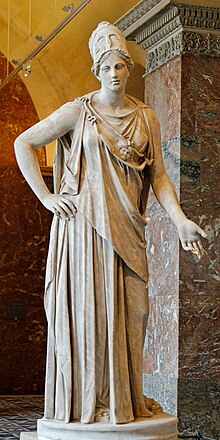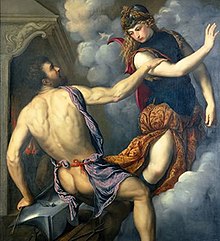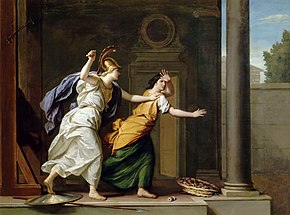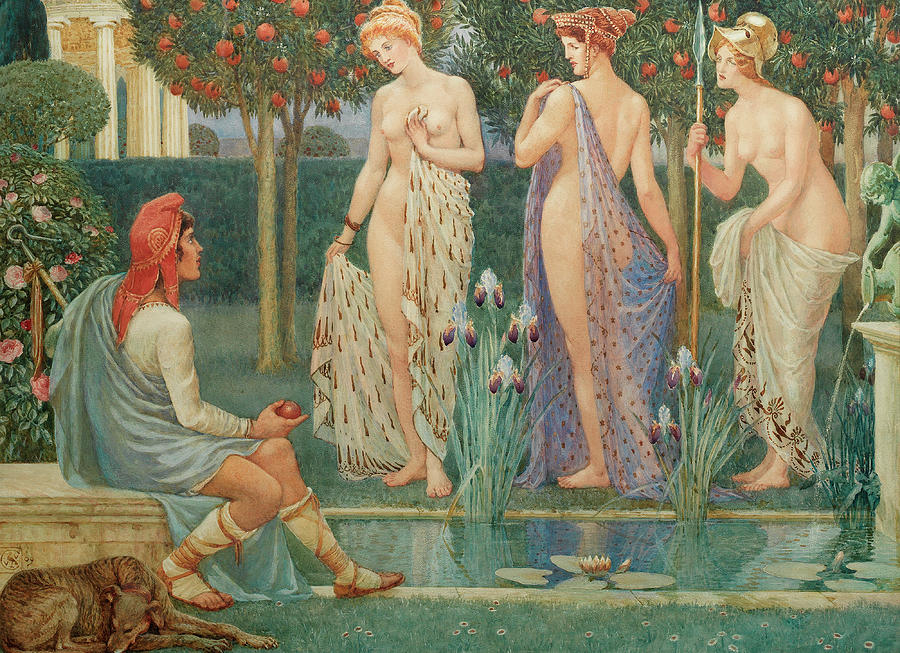Athena
Athena was a multifaceted goddess, embodying wisdom, strategy, craftsmanship, and warfare. Her portrayal as a wise and strategic deity reflected her role as the patroness of heroic endeavors and the defender of cities. Athena’s association with weaving and pottery highlighted her prowess in domestic arts and craftsmanship, showcasing her multifaceted nature as a deity.

Residence: Mount Olympus
Symbols: Owls, olive trees, snakes, Aegis, armour, helmets, spears and the Gorgon head
Parents: Zeus and Metis
Siblings: Aeacus, Angelos, Aphrodite, Apollo, Ares, Artemis, Dionysus, Ilithyia, Enyo, Eris, Ersa, Hebe, Helen of Troy, Hephaestus, Heracles, Hermes, Minos, Pandia, Persephone, Perseus, Rhadamanthus, the Graces, the Horae, the Litae, the Muses and the Moirae
Roman equivalent: Minerva
Athena’s iconic depiction with her shield, spear, and crested helm emphasized her martial aspect, symbolizing her role in warfare and the protection of her devotees. The Aegis, adorned with the fearsome visage of the Gorgon Medusa, further underscored her power and authority, serving as a potent symbol of protection and intimidation.
Throughout Greek mythology, Athena was revered for her wisdom, guidance, and strategic counsel, making her one of the most esteemed and influential goddesses in the pantheon.
Birth
The myth of Zeus and Metis, and the birth of Athena, illustrates the cunning and power of the king of the gods. By swallowing Metis, Zeus hoped to thwart the prophecy of offspring surpassing him in wisdom. However, Metis had already conceived Athena, who would emerge from Zeus’s head as a fully grown and armored goddess.

This story highlights several themes common in Greek mythology, including the struggle for power, divine cunning, and the birth of significant deities. Athena’s emergence from Zeus’s head symbolizes her association with wisdom, strategy, and divine intellect, making her one of the most revered figures in Greek mythology.
The use of the labrys, a symbol often associated with Minoan culture, adds a layer of cultural significance to the myth, showcasing the interplay between different mythological traditions within ancient Greece.
Athens
The contest between Athena and Poseidon for patronage of Athens is a famous myth in Greek mythology. Poseidon, the god of the sea and earthquakes, and Athena, the goddess of wisdom and strategic warfare, both sought to win the favor of the Athenians.

Poseidon’s gift, the salty spring, was symbolic of his domain over the sea. However, it was not particularly useful for the land-dwelling Athenians. In contrast, Athena’s gift of the olive tree was practical and beneficial. The olive tree provided wood, oil, and food, making it essential for the livelihood of the Athenians.
The Athenians, recognizing the value of Athena’s gift, chose her as their patron goddess. This decision angered Poseidon, who unleashed a monstrous flood as punishment for their rejection of him. Despite Poseidon’s wrath, Athena remained the revered patron deity of Athens, and the olive tree became a symbol of prosperity and peace in the city-state.
Erichthonius
Athena, the goddess of wisdom and warfare, visited Hephaestus, the god of craftsmanship and fire, to request weapons. However, Hephaestus, overcome by desire, attempted to assault Athena in his workshop. Determined to maintain her virginity, Athena resisted and fled, with Hephaestus in pursuit. During the struggle, Hephaestus’s seed fell on Athena’s thigh, and in disgust, she wiped it away with a scrap of wool and flung it to the earth.

From the seed that fell to the earth, Erichthonius was born, either fully formed or as an infant. Athena, wishing to keep the child’s birth a secret, placed him in a small box or basket. She entrusted the box to the care of the daughters of Cecrops, the king of Athens: Herse, Aglaurus, and Pandrosus. Athena warned them never to open the box.
Pandrosus, obedient to Athena’s command, refrained from opening the box. However, Herse and Aglaurus, driven by curiosity, disobeyed and opened it. Inside, they discovered either a serpent coiled around the infant Erichthonius or a child with a serpent-like lower body. This sight terrified them, and depending on the version of the myth, they either went insane and threw themselves off the Acropolis or were killed by the snake.
The story of Erichthonius’s birth and the consequences of disobeying divine commands serve as a mythological explanation for the origins of the first mythical king of Athens and the association of serpents with the city’s foundation.
Medusa
Medusa, a young priestess serving in the temple of Athena in Athens, took a vow of chastity as part of her dedication to the goddess. However, Poseidon, the god of the sea, lusted after Medusa and disregarded her vow, assaulting her within the sacred confines of Athena’s temple.

Upon discovering the sacrilege committed in her temple, Athena was enraged. In her wrath, she transformed Medusa into a monstrous creature with serpents for hair and a gaze that could turn any mortal who looked upon her into stone. This transformation served as a punishment for Medusa’s defilement of Athena’s temple and as a warning to others who might violate sacred spaces or vows.
The story of Medusa highlights themes of divine punishment, the consequences of hubris, and the power dynamics between gods and mortals in Greek mythology. It also explains the origins of Medusa’s monstrous form and the fearful reputation associated with her gaze.
Arachne
Arachne, the daughter of a dyer from Lydia, was a skilled weaver who became overly proud of her abilities. She boasted that her skill surpassed even that of Athena, the goddess of wisdom and crafts, and challenged Athena to a weaving contest to prove her superiority.

Athena, in disguise as an old woman, warned Arachne against offending the gods but was met with scorn and defiance. Arachne insisted on the contest, and both she and Athena began weaving their tapestries.
Athena depicted scenes of her own triumphs and the glory of the gods, while Arachne’s tapestry portrayed the indiscretions and infidelities of the gods, including Zeus’s various affairs.
Though Athena acknowledged the flawless craftsmanship of Arachne’s work, she was enraged by the disrespectful subject matter. In a fit of anger, Athena destroyed Arachne’s tapestry and loom, and then struck Arachne herself.
Overwhelmed by shame and despair, Arachne attempted to take her own life. However, Athena took pity on her and transformed her into a spider, allowing her to continue weaving for eternity but in the form of a creature condemned to spin webs.
The myth of Arachne serves as a warning against arrogance and the dangers of challenging the authority of the gods. It also explains the origin of spiders and their perpetual weaving of webs as a reflection of Arachne’s punishment.
The Judgement of Paris
At the wedding of Peleus and Thetis, all the gods and goddesses were invited except for Eris, the goddess of discord. In retaliation, Eris threw a golden apple into the festivities, inscribed with the word “To the most beautiful.” This sparked a bitter dispute among the goddesses Aphrodite, Hera, and Athena, each claiming to be the rightful owner of the apple.

Unable to settle the matter themselves, the goddesses turned to Zeus, the king of the gods, for judgment. Zeus, wary of favoring one goddess over the others, decided to let a mortal, Paris, the prince of Troy, make the choice.
The goddesses appeared before Paris, each offering him a bribe to choose her as the most beautiful. Hera promised him political power and control over Asia, Athena offered wisdom, fame, and glory in battle, and Aphrodite pledged the most beautiful mortal woman in the world as his wife.
Unable to resist the allure of Aphrodite’s offer, Paris chose her as the winner of the contest. This woman was Helen, the wife of King Menelaus of Sparta. Paris’s abduction of Helen to Troy ignited the anger of Menelaus and the Greeks, leading to the legendary Trojan War.
Thus, the Judgment of Paris, sparked by Eris’s golden apple, became the root cause of one of the most famous conflicts in Greek mythology.
Art









